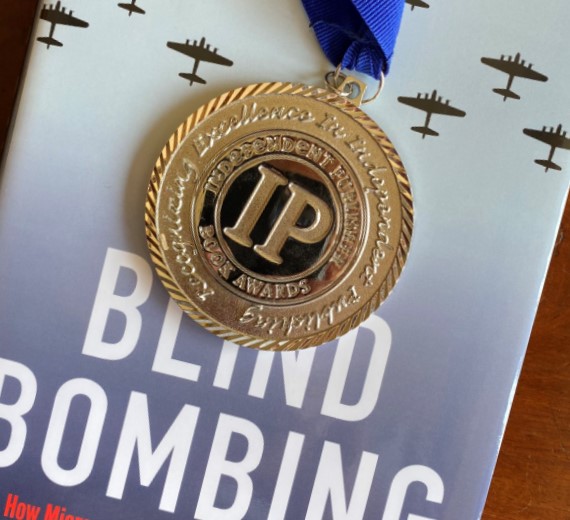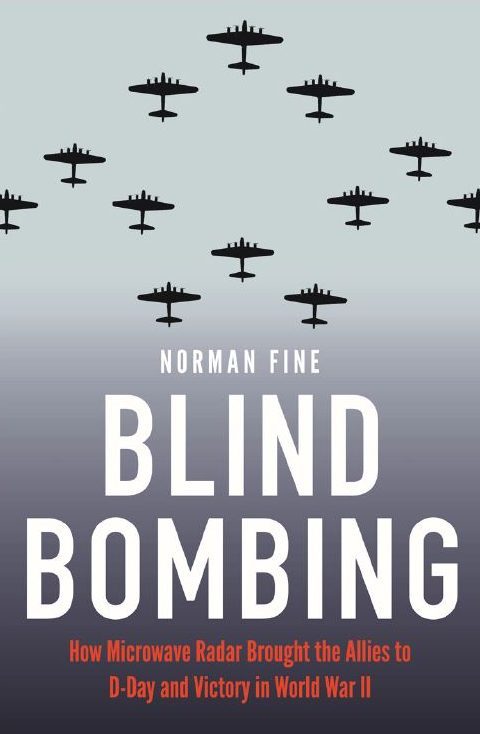- Email Norman
- P.O. Box 38, Millwood, VA 22646
Reviews & Praise
Silver Medal Winner: 2020 Independent Publisher Book Awards
Blind Bombing, published by Potomac Books, an imprint of the University of Nebraska Press, for a non-technical readership, captures the World War II invention and technological innovations that changed forever the very nature of combat.
From the invention of gunpowder in the ninth century to the airplane, tank, radar, and atom bomb in the 20th, innovation has often been a catalyst for victory. The unification of aircraft and radar during the second world war provided the nail in the Nazis’ coffin for the Allie forces.

"...a marvelous job of weaving the technological development of the microwave radar with its operational deployment and effectiveness in Europe during WWII... If you have an interest in the role technology played in helping determine the outcome of WWII this book should be high on your list. Well written, well documented..."
Hayden Hamilton
AAHS Flightline
"A riveting addition to the literature on scientific innovation during the Second World War"
Kirkus
“Took a peek and became trapped by the story and by your writing.”
Dr. Daniel Kleppner
National Medal of Science Award & multiple prize-winning Atomic physicist
"The book brings to life the scientists, military, and political leaders who made this happen, as well as the technology they developed. Fine is an engineer, but he does not get lost in dry technical detail. He always explains why what he is writing about matters to the outcome of the war."
David Hughes
Journal of Air Traffic Control
"As a former Vietnam/Cold War era navigator/bombardier, I was fascinated to learn the not well-known history and development of the system that eventually became what I was trained on and used with such precision during my Air Force career. Blind Bombing will be just as fascinating to historians, aviation buffs, and those interested in history in general."
Sheldon A. Goldberg
Ph.D., Lt Colonel, USAF (Ret)
"If you have an interest in the role technology played in helping determine the outcome of WWII this book should be high on your list. Well written, well documented...."
American Aviation Historical Society
“Reading like a detective story, Norman Fine’s spell-binding narrative reveals the little-known story of how British and American scientists developed a new radar system critically important to victory over Germany in World War II.”
Nick Kotz
Pulitzer prize-winning reporter, author of six books, including "Wild Blue Yonder: Money, Politics, and the B-1 Bomber"
“DAMN GOOD BOOK!!! ...and fine (pun intended) storytelling.”
Hayden Hamilton
Editor, American Aviation Historical Society
“I have read very few history books in my life—less than a dozen since finishing school. But I do not think I have enjoyed any of them as much as this one.”
Brian Groover
Author of "The First Jumper" and others
“This is an extremely accurate and detailed account of the development and use of microwave radar from its inception to its role in ending World War II in favor of the Allies. The book has both a technical and a personal spin that held my interest throughout.”
Col. Dick Rounseville
U.S. Army (Ret.), commander, 334 Attack Helicopter Company (Cobra)
"...[Fine] also draws on his experience in the field—a Raytheon consultant on the design of a large screen radar display scope for use by [FAA] air traffic controllers and cofounder of a cathode ray tube graphic display manufacturer—to explain in simple terms the most important breakthrough in the ultimate Allied victory."
Dartmouth Engineer
Boof Review, Fall 2019
“[Fine] takes care not to turn this intriguing story into a techie-journey of limited interest but captures us with the human side. The role of microwave radar in winning World War II is not well covered even by the notable military historians. [Blind Bombing] adds a needed element to the full understanding.”
Lt. Ken Lundstrom
U.S. Navy (ret.), Ph.D.
“Norman Fine’s well-crafted account of the development and implementation of microwave radar is a valuable addition to the backstory of the Allied victory in World War II. Fine also has a personal stake in the story: His Uncle Stanley was one of the quiet heroes who risked everything to bring the new radar to the skies over Europe. A deeply satisfying read on multiple levels."
Howard Means
Author of "67 Shots: Kent State and the End of American Innocence"
“Norman Fine is an excellent choice to write this book. An electronics engineer and founder of a high tech company, Fine is also a talented writer who has founded two popular magazines related to horse sports. (It sorta makes you wonder when this guy sleeps.) I commend to you his other books, as well.”
Robin Traywick Williams
Author of "The Key to the Quarter Pole," former chairman of the Racing Commission, Commonwealth of Virginia
“Though a retired electronics engineer, he writes like a novelist-historian....The book is part thriller, part history, part technical, and part personal. Fine does a brilliant job of integrating [all the] components. I learned a great deal....I can see a powerfully moving film made from this book.”
Lou Buttino
M.A., Ph.D, award-winning playwright, screenwriter, filmmaker
“Norman Fine's fascinating and readable book sheds light on [a] little-known scientific breakthrough....[and] explains the technical aspects of radar clearly enough that science doesn’t slow the arc of the narrative.”
Kit Naylor
Book Reviewer, Goodreads
“Both in scope and detail, Norman Fine's scrupulously-researched story of American and British ingenuity and determination is a gripping read, even for a reader unfamiliar with military science and engineering.”
Karin Winegar
Author of "Lost Man Found," writer for The New York Times, Wall Street Journal, Minneapolis Star Tribune
“To completely understand the Allied victory in World War II, read Norman Fine’s new book. Snappy, engrossing prose, vivid aerial combat scenes, and Fine’s ability to relate his uncle’s combat experience imparts a thrilling human dimension to the story of a key technological breakthrough that enabled the Allies to defeat Nazi Germany."
The Honorable G. Philip Hughes
Senior Vice President, Council of American Ambassadors
